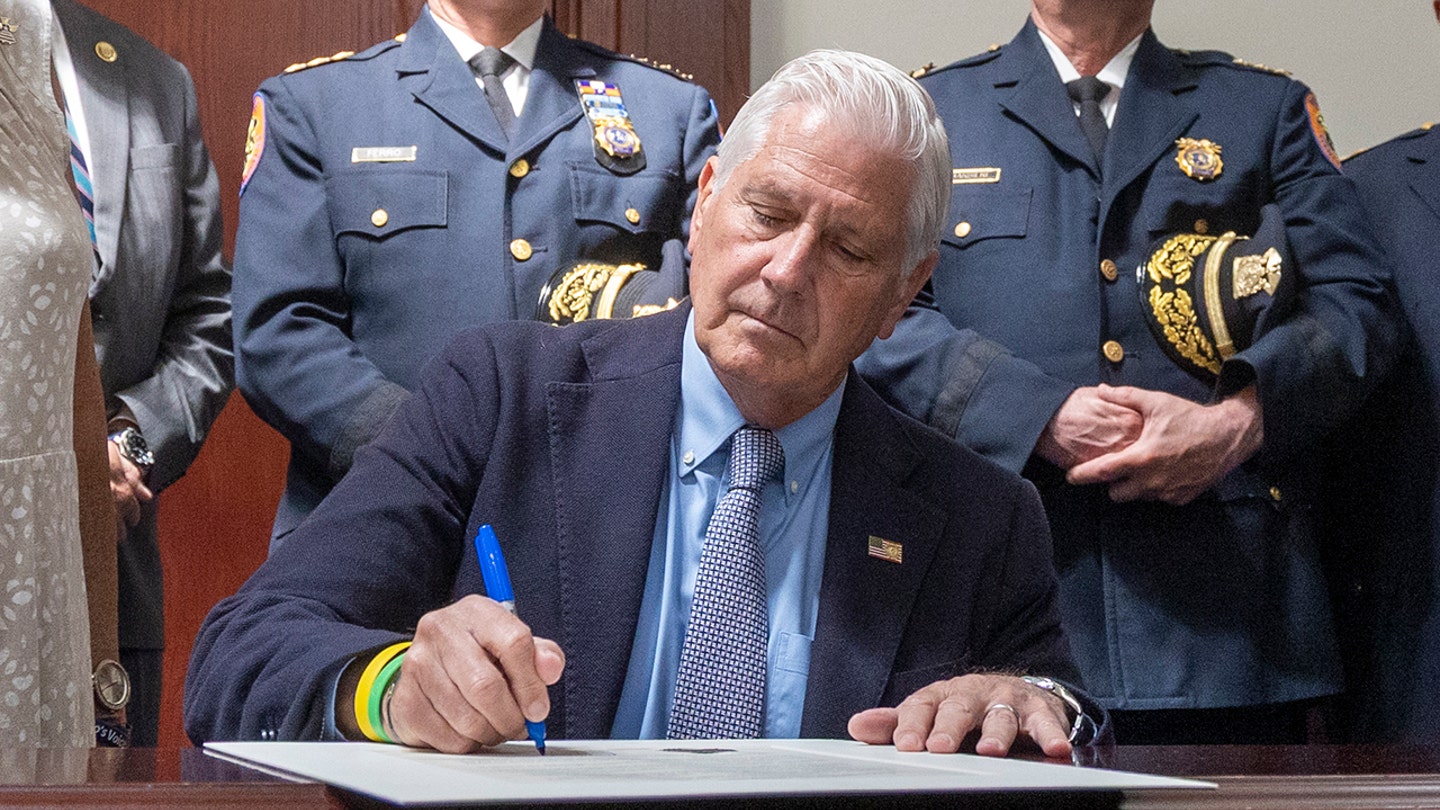
Tommy Tuberville slams Democrats for ‘demonizing’ young male voters after AOC ‘masculinity’ remarks backfire
Entities mentioned:
- Alexandria Ocasio-Cortez: Righteousness, Moral outrage, Influence
- Tommy Tuberville: Competitive spirit, Pride, Loyalty
- Republican Party: Competitive spirit, Power, Control
- Democratic Party: Anxiety, Self-preservation, Competitive spirit
Article Assessment:
Credibility Score: 70/100
Bias Rating: 65/100 (Lean Right)
Sentiment Score: 40/100
Authoritarianism Risk: 35/100 (Generally Democratic)
Bias Analysis:
The article leans right, presenting Republican viewpoints more favorably and extensively. It dedicates more space to critiquing Democratic positions and highlighting Republican electoral gains among young male voters.
Key metric: Voter Demographics
Let me tell you something, folks - this political matchup is HEATING UP! We've got a real battle for the hearts and minds of young male voters, and it's looking like a fourth-quarter comeback for the Republicans! The Democrats are fumbling the ball with their game plan, accusing young men of toxic masculinity. But wait! Here comes Coach Tuberville off the sidelines with a MASSIVE defensive play! He's tackling AOC's comments head-on, reminding us of the championship mentality he instilled in his players. The GOP is running a full-court press on patriotism and hard work, while the Dems are playing defense, desperately trying to regain possession of the male vote. I'm telling you right now, if the Democrats don't change their strategy FAST, they might find themselves benched in future elections! This is a crucial play in the long game of political demographics, and right now, the Republicans are DOMINATING the scoreboard!

Ex-UPenn swimmer Lia Thomas to receive 'Voice of Inspiration' Award at Dodgers-sponsored event
Entities mentioned:
- Lia Thomas: Recognition, Ambition, Self-respect
- Rainbow Labs: Unity, Justice, Influence
- Riley Gaines: Competitive spirit, Righteousness, Moral outrage
- Los Angeles Dodgers: Recognition, Influence, Professional pride
Article Assessment:
Credibility Score: 65/100
Bias Rating: 65/100 (Lean Right)
Sentiment Score: 35/100
Authoritarianism Risk: 40/100 (Generally Democratic)
Bias Analysis:
The article leans right, giving more space to critical voices like Riley Gaines. It also uses loaded language when describing transgender issues, potentially swaying reader opinion.
Key metric: Gender Equality in Sports
Let me tell you something - this story is a GAME-CHANGER in the world of sports! We're seeing a real clash of titans here, folks, with Lia Thomas stepping up to the plate and swinging for the fences in the fight for transgender rights in athletics. But hold onto your hats, because Riley Gaines is coming in hot with a defensive play that could turn this whole match around! The Dodgers are playing both sides of the field here, trying to score points with multiple fan bases. This isn't just a swim meet anymore, people - we're talking about a full-on ideological decathlon that's going into overtime! The rules of the game are changing, and everyone's fighting for their spot on the podium. It's fourth quarter, it's do or die, and I'm telling you right now, this controversy is far from over!

Colts' Zaire Franklin backs suspended Lions safety Brian Branch over JuJu Smith-Schuster fight
Entities mentioned:
- Zaire Franklin: Competitive spirit, Righteousness, Moral outrage
- Brian Branch: Self-respect, Competitive spirit, Indignation
- JuJu Smith-Schuster: Competitive spirit, Self-preservation, Pride
- Dan Campbell: Professional pride, Duty, Righteousness
Article Assessment:
Credibility Score: 75/100
Bias Rating: 50/100 (Center)
Sentiment Score: 35/100
Authoritarianism Risk: 30/100 (Generally Democratic)
Bias Analysis:
The article presents multiple perspectives, including players and coaches. It balances quotes supporting and condemning the incident, maintaining a relatively neutral stance.
Key metric: NFL Player Conduct
Let me tell you something, folks - this is RIDICULOUS! We've got a full-on GRUDGE MATCH brewing in the NFL! Zaire Franklin is coming off the top rope, backing Brian Branch like he's tag-teaming in the WWE! JuJu Smith-Schuster? He's playing dirty pool, folks, and Franklin's calling him out for his unsportsmanlike conduct! This isn't just about football anymore - it's about RESPECT on the field! Branch might be sidelined for a game, but in the court of player opinion, he's stepping up to the plate and sending a message: no more Mr. Nice Guy! Meanwhile, Coach Campbell is playing referee, trying to keep his team's reputation clean in this high-stakes game of integrity. I'm telling you right now, this kind of tension could be a game-changer for team dynamics across the league!

Brewers fan loses job after imploring she would 'call ICE' on Hispanic Dodgers supporter: report
Entities mentioned:
- Shannon Kobylarczyk: Competitive spirit, Pride, Moral outrage
- Ricardo Fosado: Self-respect, Pride, Justice
- Milwaukee Brewers: Professional pride, Competitive spirit, Unity
- Los Angeles Dodgers: Competitive spirit, Ambition, Determination
- ManpowerGroup: Professional pride, Self-preservation, Reputation
- Make-A-Wish Wisconsin: Reputation, Unity, Professional pride
Article Assessment:
Credibility Score: 75/100
Bias Rating: 45/100 (Center)
Sentiment Score: 30/100
Authoritarianism Risk: 25/100 (Generally Democratic)
Bias Analysis:
The article presents multiple perspectives, including statements from both involved parties and the Brewers organization. It maintains a relatively neutral tone, balancing the incident details with contextual information.
Key metric: Social Cohesion
Let me tell you something, folks - this is a CLASSIC case of unsportsmanlike conduct in the stands! We've got a fan who's WAY out of bounds, throwing racial Hail Marys when her team's down in the count. This is the kind of foul play that has no place in America's pastime or ANY sport! I'm telling you right now, Kobylarczyk's ICE threat is like calling for a flagrant foul on a clean play - it's RIDICULOUS and shows a complete lack of teamwork in the bleachers. Fosado, a true MVP with his military service, is taking the high road like a champ, but the league - I mean, society - is cracking down on this bush league behavior. The Brewers and those companies are running a full-court press defense, ejecting both players from the game to protect their home court advantage in the court of public opinion. This is a fourth-quarter move that shows they're playing to win in the long game of social responsibility. The ball's in our court now, America - it's time to step up to the plate and show that in the game of life, we're all on the same team!

NBA suspends employee who made crude remarks following Charlie Kirk assassination
Entities mentioned:
- NBA: Professional pride, Control, Self-preservation
- NBA Employee: Moral outrage, Indignation, Self-expression
- Charlie Kirk: Influence, Legacy, Righteousness
- Donald Trump: Legacy, Power, Recognition
- Turning Point USA: Competitive spirit, Influence, Recognition
- NFL: Professional pride, Control, Recognition
Article Assessment:
Credibility Score: 70/100
Bias Rating: 65/100 (Lean Right)
Sentiment Score: 30/100
Authoritarianism Risk: 35/100 (Generally Democratic)
Bias Analysis:
The article leans right due to its focus on conservative figures and reliance on right-leaning sources like Fox News and OutKick. However, it does present some factual information from the NBA directly.
Key metric: Political Polarization Index
Folks, we're witnessing a MAJOR FOUL on the court of public discourse! The NBA, usually a slam-dunk when it comes to PR, just air-balled with this employee situation. Let me tell you something - this is a GAME-CHANGING moment! The league is playing defense, trying to protect its brand from a rogue player who went way out of bounds with their comments. It's like they're in the fourth quarter, down by 20, and desperately need to rally. The suspension is their Hail Mary pass, but will it be enough to win back the crowd? Meanwhile, Turning Point USA is making a bold offensive play, going head-to-head with the NFL in a Super Bowl showdown. This is the kind of high-stakes competition that separates the champions from the benchwarmers, folks! The political arena has become a full-contact sport, and these players are leaving it all on the field. I'm telling you right now, we're in for one heck of a matchup!

California girls' volleyball team with trans player sees 10th match forfeited amid controversy
Entities mentioned:
- Jurupa Valley High School girls' volleyball team: Competitive spirit, Unity, Determination
- Alyssa McPherson: Justice, Self-respect, Moral outrage
- AB Hernandez: Competitive spirit, Recognition, Self-preservation
- California Interscholastic Federation (CIF): Obligation, Control, Professional pride
- Gavin Newsom: Ambition, Influence, Wariness
- Donald Trump: Power, Moral outrage, Influence
Article Assessment:
Credibility Score: 75/100
Bias Rating: 55/100 (Center)
Sentiment Score: 35/100
Authoritarianism Risk: 40/100 (Generally Democratic)
Bias Analysis:
The article presents multiple perspectives, including those of transgender athletes, protesting players, and political figures. While it leans slightly right by emphasizing controversy, it maintains a relatively balanced approach.
Key metric: Gender Equality in Sports
Let me tell you something, folks - this story is a GAME-CHANGER! We're seeing a full-court press of controversy in California high school volleyball, with teams forfeiting left and right like they're dodging a spike from the opposing side. The Jurupa Valley squad is facing a defensive wall of forfeits, but they're showing true championship mentality by staying in the game. This is a classic matchup of inclusivity versus traditional competition, and both sides are digging deep into their playbooks. The political power players are stepping onto the court too, with Governor Newsom trying to find the middle ground while Trump is calling for a full-court press against transgender athletes. It's a high-stakes match with no clear winner in sight, and the clock is ticking as we head into the postseason. I'm telling you right now, this is one for the record books!

Ex-Braves closer John Rocker makes disparaging comments about Uber drivers in social media post
Entities mentioned:
- John Rocker: Recognition, Moral outrage, Indignation
- Uber: Professional pride, Competitive spirit, Influence
- Atlanta Braves: Competitive spirit, Professional pride, Legacy
Article Assessment:
Credibility Score: 75/100
Bias Rating: 55/100 (Center)
Sentiment Score: 25/100
Authoritarianism Risk: 30/100 (Generally Democratic)
Bias Analysis:
The article presents facts about Rocker's comments without overtly taking sides. It includes historical context of his past controversial statements, maintaining a fairly neutral stance.
Key metric: Social Cohesion and Inclusion
Let me tell you something - this story is a MAJOR FOUL! John Rocker, once a star closer, has thrown a wild pitch way outside the strike zone of decency! This isn't just a strikeout, folks, it's a bench-clearing brawl in the culture wars! Rocker's coming out swinging with these comments, but he's fighting a losing battle against the team of progress and inclusivity. Uber, a top-tier player in the transportation league, is facing a curveball here. They've got to step up to the plate and knock this controversy out of the park with a grand slam of a response. The Atlanta Braves, Rocker's former team, are probably watching from the dugout, hoping they don't get dragged into extra innings on this one. I'm telling you right now, in the big leagues of public opinion, Rocker's playing like a rookie with these bush-league tactics!

Court rejects Israel’s appeal after Indonesia refused to grant team’s visas to artistic gymnastics world championships
Entities mentioned:
- Court of Arbitration for Sport: Justice, Duty, Impartiality
- Israel Gymnastics Federation: Competitive spirit, Pride, Justice
- International Gymnastic Federation (FIG): Professional pride, Obligation, Wariness
- Indonesia government: Moral outrage, Unity, Control
- Artem Dolgopyat: Competitive spirit, Pride, Recognition
Article Assessment:
Credibility Score: 75/100
Bias Rating: 55/100 (Center)
Sentiment Score: 30/100
Authoritarianism Risk: 45/100 (Mixed/Neutral)
Bias Analysis:
The article presents facts from multiple perspectives, including Israel, Indonesia, and international sports bodies. While it mentions the broader context of the Gaza conflict, it doesn't overtly favor either side's position.
Key metric: International Sports Participation
Let me tell you something, folks - this is a RIDICULOUS situation unfolding on the global gymnastics stage! We're seeing a real clash of titans here, with Israel's gymnastics squad getting shut out of the big dance in Jakarta. It's like they've been hit with a blindside tackle before the game even started! The Court of Arbitration for Sport, acting as the ultimate referee, has blown the whistle on Israel's Hail Mary attempt to get back in the game. Meanwhile, Indonesia is playing some serious defense, refusing to let Team Israel step foot on their turf. The International Gymnastic Federation? They're caught in the middle like a deer in the headlights, folks! This is a fourth-quarter drama that could change the whole landscape of international gymnastics. With Olympic gold medalist Artem Dolgopyat warming up on the sidelines, Israel's hopes of defending their title are hanging by a thread. It's crunch time, and the clock is ticking!

Long Island county executive vows to ‘protect’ women’s sports after appeals court halts trans athlete ban
Entities mentioned:
- Bruce Blakeman: Competitive spirit, Righteousness, Determination
- Nassau County: Control, Justice, Security
- Long Island Roller Rebels: Justice, Self-respect, Unity
- Amanda Urena: Justice, Self-respect, Recognition
- New York Civil Liberties Union: Justice, Righteousness, Moral outrage
Article Assessment:
Credibility Score: 75/100
Bias Rating: 55/100 (Center)
Sentiment Score: 40/100
Authoritarianism Risk: 35/100 (Generally Democratic)
Bias Analysis:
The article presents both sides of the argument, quoting officials and activists from opposing viewpoints. While it gives slightly more space to Blakeman's perspective, it also includes counterarguments and legal context.
Key metric: Gender Equality in Sports Participation
Let me tell you something - this is a MAJOR LEAGUE showdown, folks! We've got a real clash of titans here as Nassau County and Bruce Blakeman are trying to run a full-court press against transgender athletes. But hold onto your hats, because the appeals court just threw a HUGE red flag on the play! This is like watching a championship game go into sudden death overtime. Blakeman's team is showing that never-say-die attitude, vowing to keep fighting despite this setback. Meanwhile, the Long Island Roller Rebels are celebrating like they've just won the World Series! But mark my words, this game is far from over. We're seeing some fourth-quarter heroics from both sides, and it's anyone's guess who'll come out on top when the final whistle blows. This isn't just about sports, folks - it's about the very nature of fair play and what it means to compete on a level playing field. Stay tuned, because this matchup is going right down to the wire!

Texas Tech investigates after Kansas football coach says pocket knife was thrown at staffer
Entities mentioned:
- Lance Leipold: Righteousness, Moral outrage, Professional pride
- Texas Tech: Self-preservation, Obligation, Control
- Joey McGuire: Duty, Self-preservation, Unity
- Texas Tech fans: Pride, Competitive spirit, Enthusiasm
Article Assessment:
Credibility Score: 75/100
Bias Rating: 50/100 (Center)
Sentiment Score: 25/100
Authoritarianism Risk: 30/100 (Generally Democratic)
Bias Analysis:
The article presents multiple perspectives, including quotes from both coaches involved. It reports on the incident and investigation without taking sides, maintaining a balanced approach.
Key metric: NCAA Football Fan Conduct and Safety
Let me tell you something - this story is RIDICULOUS! We've got a MAJOR LEAGUE FUMBLE in fan conduct at Texas Tech! Coach Leipold is stepping up to the plate, calling out this dangerous play like a true team captain. The Red Raiders' fanbase is playing with fire, folks! This isn't just unsportsmanlike conduct, it's a potential game-ender for stadium safety. Texas Tech needs to huddle up and execute a full-court press on security measures before someone gets injured on the sidelines. It's fourth quarter for the Big 12 officials - they need to blow the whistle on this behavior and lay down the law! This incident is a real Hail Mary for college football's reputation, and it's time for Texas Tech to show some championship-level crowd control!